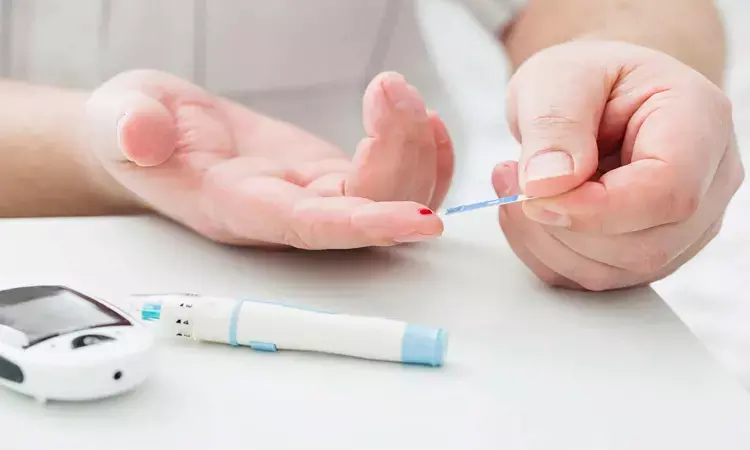- Home
- Medical news & Guidelines
- Anesthesiology
- Cardiology and CTVS
- Critical Care
- Dentistry
- Dermatology
- Diabetes and Endocrinology
- ENT
- Gastroenterology
- Medicine
- Nephrology
- Neurology
- Obstretics-Gynaecology
- Oncology
- Ophthalmology
- Orthopaedics
- Pediatrics-Neonatology
- Psychiatry
- Pulmonology
- Radiology
- Surgery
- Urology
- Laboratory Medicine
- Diet
- Nursing
- Paramedical
- Physiotherapy
- Health news
- Fact Check
- Bone Health Fact Check
- Brain Health Fact Check
- Cancer Related Fact Check
- Child Care Fact Check
- Dental and oral health fact check
- Diabetes and metabolic health fact check
- Diet and Nutrition Fact Check
- Eye and ENT Care Fact Check
- Fitness fact check
- Gut health fact check
- Heart health fact check
- Kidney health fact check
- Medical education fact check
- Men's health fact check
- Respiratory fact check
- Skin and hair care fact check
- Vaccine and Immunization fact check
- Women's health fact check
- AYUSH
- State News
- Andaman and Nicobar Islands
- Andhra Pradesh
- Arunachal Pradesh
- Assam
- Bihar
- Chandigarh
- Chattisgarh
- Dadra and Nagar Haveli
- Daman and Diu
- Delhi
- Goa
- Gujarat
- Haryana
- Himachal Pradesh
- Jammu & Kashmir
- Jharkhand
- Karnataka
- Kerala
- Ladakh
- Lakshadweep
- Madhya Pradesh
- Maharashtra
- Manipur
- Meghalaya
- Mizoram
- Nagaland
- Odisha
- Puducherry
- Punjab
- Rajasthan
- Sikkim
- Tamil Nadu
- Telangana
- Tripura
- Uttar Pradesh
- Uttrakhand
- West Bengal
- Medical Education
- Industry
Type 2 Diabetes has detrimental effect on youth's bone density, finds study

USA: Around the age of peak bone mass, type 2 diabetes (T2D) may be detrimental to bone density, suggests a recent study in the journal Diabetes Care. The findings are significant given the increased risk of fracture in T2D adults.
There is an increasing incidence of youth-onset type 2 diabetes, an aggressive condition. T2D adults are at increased fracture risk despite normal areal bone mineral density (aBMD), but there is no information on the influence of diabetes on the growing skeleton. Joseph M. Kindler, Children's Hospital of Philadelphia, Philadelphia, PA, and colleagues compared bone health in youth with type 2 diabetes to control patients with obesity or healthy weight.
The researchers conducted a cross-sectional study of youth (56% African American, 67% female) ages 10–23 years with type 2 diabetes (n = 180), obesity (BMI >95th; n = 226), or healthy weight (BMI <85th; n = 238). They assessed the whole body (less head) aBMD and lean mass as well as abdominal visceral fat via DXA. Lean BMI (LBMI) and aBMD SD scores (z scores) were computed using published reference data.
Key findings of the study include:
- Age-dependent differences was observed in aBMD and LBMI z scores between the healthy weight, obese, and type 2 diabetes groups.
- In children, aBMD and LBMI z scores were greater in the type 2 diabetes group versus the obese group, but in adolescents and young adults, aBMD and LBMI z scores were lower in the type 2 diabetes group versus the obese group.
- In the type 2 diabetes group and the obese group, aBMD was about 0.5 SDs lower for a given LBMI z score compared with healthy weight control patients.
- aBMD was lower in those with greater visceral fat.
"Given the increased fracture risk in adults with type 2 diabetes, there is a pressing need for longitudinal studies aimed at understanding the influence of diabetes on the growing skeleton," concluded the authors.
The study, "Bone Mass and Density in Youth With Type 2 Diabetes, Obesity, and Healthy Weight," is published in the journal Diabetes Care.
DOI: https://doi.org/10.2337/dc19-2164
Dr Kamal Kant Kohli-MBBS, DTCD- a chest specialist with more than 30 years of practice and a flair for writing clinical articles, Dr Kamal Kant Kohli joined Medical Dialogues as a Chief Editor of Medical News. Besides writing articles, as an editor, he proofreads and verifies all the medical content published on Medical Dialogues including those coming from journals, studies,medical conferences,guidelines etc. Email: drkohli@medicaldialogues.in. Contact no. 011-43720751


